Civil Liberties, Civil Rights, genocide, Human Rights, Political Prisoner, Prison Industry
Podcast: Play in new window | Download
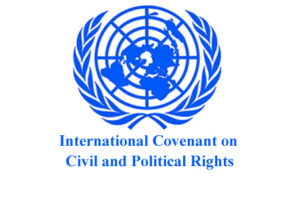

US Obligation To The International Covenant on Civil and Political Rights
A United Nations body has issued a damning report blasting the United States for its rampant violations of a major human rights treaty that it ratified in 1992. The International Covenant on Civil and Political Rights, or ICCPR, enshrines fair trial rights, the right to life, to vote, and to freedom of expression and assembly. It prohibits torture and cruel, inhuman or degrading treatment or punishment. It also forbids discrimination in the enjoyment of civil and political rights based on race, color, sex, language, religion, political or other opinion, national or social origin, property, birth or other status (which includes sexual orientation).
The Human Rights Committee is a group of 18 independent experts that monitor the implementation of the ICCPR by its States Parties, each of whom files periodic reports on their progress in implementing the obligations in the treaty.
In its November 3, 2023 report on U.S compliance with the ICCPR, the Human Rights Committee found 30 some violations of the treaty by the United States. Racial discrimination permeated two-thirds of the documented U.S. violations.
In addition to discrimination based on race, the Committee found several instances of discrimination against women, particularly in the area of reproductive rights. The Committee also found discrimination on the basis of real or perceived sexual orientation or gender identity.
Guest – Marjorie Cohn is professor emerita at Thomas Jefferson School of Law, former president of the National Lawyers Guild, and a member of the national advisory boards of Assange Defense and Veterans for Peace, and the bureau of the International Association of Democratic Lawyers. Her books include “The United States and Torture: Interrogation, Incarceration, and Abuse” and “Drones and Targeted Killing: Legal, Moral and Geopolitical Issues.” Marjorie is founding dean of the People’s Academy of International Law. Her article about the report of the Human Rights Committee was published last week by Truthout.
—-
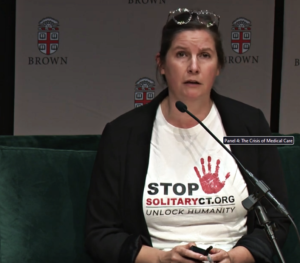

Voices of Mass Incarceration: A Symposium
Opening with a keynote discussion featuring Angela Davis, Pam Africa, Julia Wright, and Johanna Fernández, the event featured two dozen experts and artists working and studying incarceration and its wide-ranging effects on society. The second day of the symposium also marked the opening of the Mumia Abu-Jamal papers for research at the John Hay Library with the launch of the exhibit, Mumia Abu-Jamal: A Portrait of Mass Incarceration. This exhibition centers on the writing, music and art of Mumia Abu-Jamal, whose papers anchor the John Hay Library’s Voices of Mass Incarceration in the United States collection. Mumia has been imprisoned for 43 years for allegedly killing Philadelphia police officer Daniel Faulkner.
One of the panels focused on how systemic changes have strained the existing healthcare system. With 44% of prison detainees receiving a psychiatric diagnosis, prisons are now among the largest providers of healthcare, more so than major hospitals and other care facilities.
We are pleased to bring you the remarks of Hope Metcalf, Lecturer at Yale Law School, on medical care for incarcerated individuals including mental health and hepatitis C. We’ll also hear from Lauren Weinstock, Professor of Psychiatry and Human Behavior at Brown University.
Hosted by attorneys Heidi Boghosian and Marjorie Cohn

——————————————————–
Civil Liberties, Civil Rights, Human Rights, Political Prisoner, Prison Industry, U.S. Militarism, Violations of U.S. and International Law, War Resister, Whistleblowers
Podcast: Play in new window | Download
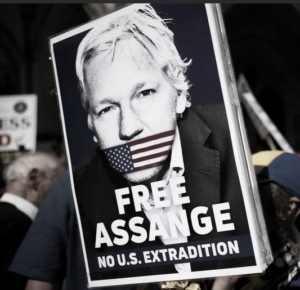
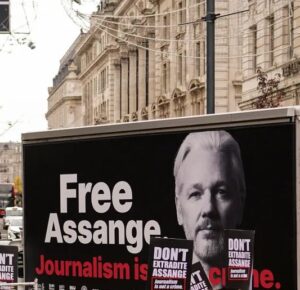
Trilateral Security Alliance Meet to Request Assange Extradition
Australian Prime Minister Anthony Albanese was in Washington last week meeting with Joe Biden. They discussed AUKUS, the trilateral “security” alliance between the U.S., UK and Australia, which is a bulwark against the perceived threat from China. AUKUS seeks to transfer U.S. and British nuclear submarine technology to Australia. But Australia’s support for a potential U.S. war against China over Taiwan, which China considers part of China, is not a foregone conclusion.
Also reportedly on the agenda for the high-level meeting was the U.S. request for extradition of WikiLeaks founder Julian Assange, who is an Australian citizen. Assange has been held for four years in a high-security London prison. He is facing 175 years in prison if extradited, tried and convicted in the U.S. for charges under the Espionage Act for revealing evidence of U.S. war crimes.
Albanese and a multi-party coalition of the Australian parliament, as well as 90% of the Australian population, want the prosecution of Assange dropped. Assange’s freedom is “widely seen as a test of Australia’s leverage with the Biden administration,” according to the Associated Press.
AssangeDefense.org
Guest – Stephen Rohde, is an author and social justice advocate who practiced civil rights and constitutional law for more than 45 years, including representing two men on California’s death row. He is a founder and current chair of Interfaith Communities United for Justice and Peace, former chair of the ACLU Foundation of Southern California and former national chair of Bend the Arc, a Jewish Partnership for Justice. He is also a board member of Death Penalty Focus and is active in the Los Angeles branch of Assange Defense. Steve is the author of an article published last week by LA Progressive titled, “Is Biden Willing to Damage Relations With a Staunch Ally Like Australia in His Headlong Prosecution of Julian Assange?”
—-


State Laws Governing Deep Fake Videos
Artificial intelligence-generated fake videos, known as “deepfakes,” have become increasingly prevalent and sophisticated. This technology manipulates both audio and visual elements to fabricate fictitious events. In 2019, Deeptrace, an AI firm, identified a total of 15,000 deepfake videos online. Shockingly, 96% of these were of a pornographic nature, with 99% involving the superimposition of female celebrities’ faces onto pornographic content, also known as “face-swapped pornography,” all done without the celebrities’ consent. However, it’s important to note that non-celebrities are also frequent targets of deepfake abuse. Particularly concerning is the fact that women are often singled out, with AI tools and apps readily available that enable users to digitally remove clothing from their photos or insert their faces into explicit videos. These tools are easily accessible and require no specialized technical skills. Equally troubling is the fact that most of the time the women who are deepfake targets are neither aware of nor consent to their images being used in this way.
Social media platforms have become fertile ground for deepfake scams. Deepfakes are employed for various malicious purposes, including gaining a political advantage, spreading fake news, and disseminating “revenge porn.” In the case of pornographic videos, offenders may use deepfakes to groom, harass, or extort their victims. Additionally, deepfakes can be utilized to bully individuals or steal their identities. It’s worth noting that, although AI-generated deepfakes can appear highly realistic, most of them exhibit certain inconsistencies. These may manifest as peculiar facial features, awkward placements, or unnatural postures and movements. Creating deepfakes is a time-consuming and labor-intensive process, which results in most of them being relatively short in duration.
The prevalence of deepfakes has grown significantly, more than doubling between 2022 and the first quarter of 2023. In response to this trend, the FBI issued a warning in 2023 about “sextortion schemes” in which criminals collect photos and videos from social media platforms to produce “sexually themed” deepfakes, which they then use to extort money from their victims.
Guest – Criminal defense attorney Nicholas Toufexis joins us to talk about the impact off deepfake pornography on victims and the current state of the law governing these videos. Nick is a partner in the Texas law firm Saputo Toufexis Criminal Defense.
Hosted by Attorneys Heidi Boghosian and Marjorie Cohn

——————————————-
Civil Liberties, Civil Rights, Criminalizing Dissent, Human Rights, Prison Industry
Podcast: Play in new window | Download

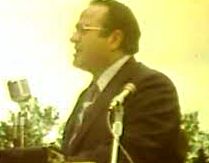
Remembering South Dakota Senator Jim Abourezk
South Dakota senator Jim Abourezk was an important figure in American politics. He died four months ago at age 92. Abourzeck was the son of immigrants from Lebanon. He grew up on the Rosebud Sioux Indian reservation. Politically he was part of the radicalization of the 60s. He served one term in the US House of Representatives and another in the United States Senate. Elected in 1973, Abourezk fought for policies that are crucially relevant today. He was against American imperial power and opposed the war in Vietnam. He tried to rein in the murderous CIA. He attempted to break up the powerful of big oil companies. He fought for Native American rights, normalization of American relations with Cuba, a government the USA has been trying to overthrow since the Cuban revolution of 1959.
After six years, despite extreme pressure from those who supported him, he left the Senate. disgusted by the power wielded by the monied influence of big business. Jim Abourezk went back to South Dakota and back to the his law practice. Jim Abourezk founded the Arab-American anti-discrimination committee because of the oppression Arabs faced both of United States and abroad, particularly in Palestine.
Guest – Charlie Abourezk, from Rapid City, South Dakota and is a trial attorney, longtime activist and community organizer in the native American community in South Dakota. He is also a documentary film maker, his most recent is the feature length documentary “A Tattoo On My Heart: The Warriors of Wounded Knee 1973” which played on public television stations around the United States. He is the current Chief Justice of the Rosebud Sioux Tribe’s Supreme Court and a member of the South Dakota Advisory Committee to the US Commission on Civil Rights. His client base is made up largely of Native Americans, tribal schools and Indian tribal governments, but he also represents plaintiffs in civil rights litigation.
Guest – Alya James – Architectural Designer living in New York City.
—-
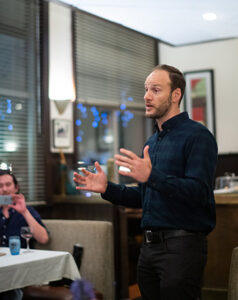

Former San Francisco DA Chesa Boudin Teaching At Berkeley Criminal Law and Justice Center
We turn to the subject of the criminal justice system – or, as a growing number of advocates refer to it, the criminal legal system. One reason for the name change is because it’s clear that our system of policing, prosecuting, judging, and sentencing rarely brings about justice. After all, our system was born nearly 250 years ago, at a time when slavery was legal and only white men with property could participate in public life, including voting. Non-white people were thought of as less than human, and women were afforded little if any autonomy apart from the men in their lives.
Since then, we’ve tried to correct course with laws and constitutional amendments that aim to protect everyone equally from the abuse of government power. But real-world statistics show that still – in 2023 – the criminal legal system does not treat all defendants equally, and not all defendants are presumed innocent until proven guilty. Black men, for example, are arrested more, charged more, and given higher sentences than others in similar circumstances.
Guest – Chesa Boudin, founding executive director of Berkeley Law’s new Criminal Law & Justice Center is embarking on a new journey to study, brainstorm, experiment and transform for the better how the criminal legal system operates. He is uniquely suited for this new role, since he’s had experience not only in the public defender’s office representing criminal defendants, but also as the former District Attorney of San Francisco. And he’s unique in the legal profession for another reason: when he was just 14 months of age, he was separated from his parents, radical activists David Gilbert and Kathy Boudin. They were serving very long prison sentences for their part in an armored truck robbery which went astray and where three people killed. He saw firsthand the harmful impact of incarceration on those inside, as well as their families, communities, and society as a whole. These experiences informed his studies as a Rhodes scholar and as a student at Yale, his work as a lawyer, and most importantly, as a devoted husband, father and son. @berkeleylawcljc

—————————————
Civil Liberties, Civil Rights, Political Prisoner, Prison Industry, Racist Police Violence
Podcast: Play in new window | Download
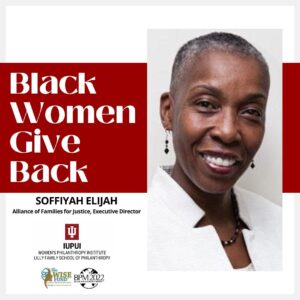

The Alliance of Families for Justice
The Alliance of Families for Justice (“AFJ”) was founded seven years ago by attorney Soffiyah Elijah. Its headquarters is in Harlem, a community heavily impacted by mass incarceration. AFJ also has satellite offices in Albany and Ithaca.
AFJ seeks to heal families and individuals who suffer from their own imprisonment or that of a loved one. It seeks moreover to organize and empower them to challenge and change the system of mass incarceration. AFJ’s legal support unit provides free legal representation to incarcerated people and their families. AFJ holds weekly community organizing meetings and family empowerment circles, and monthly healing circles for formerly incarcerated people. Its organizing and advocacy unit spearheads various campaigns including one to #Shutdown Attica and another to end felony disenfranchisement. AFJ’s Youth Empowerment Project has serviced over 400 NYC young people ages 16-24 in its 3yr tenure. All of AFJ’s services are free.
In New York State and most places nationwide incarcerated people lose their voting rights. This is both un-democratic and, because most incarcerated people are Black or Latinix, it is a racist policy and a vestige of Jim Crow laws that permeated New York and most states. The loss of voting rights remains a significant obstacle to criminal justice reform.
Guest – Attorney Soffiyah Elijah, knows intimately what happens to families whose loved ones are put in prison. She has been able through AFJ to support, motivate and educate these families to become advocates for civil rights and justice reform. Attorney Elijah has headed legal clinics at the City University of New York School of Law and has served as the Deputy Director of the Criminal Justice Institute at Harvard University, under Professor Charles Ogletree. She was the first woman and first Black Executive Director of the 170yr old Correctional Association of New York where she helped expose and bring to justice several Attica prison guards for brutally beating a man almost to death.
—-
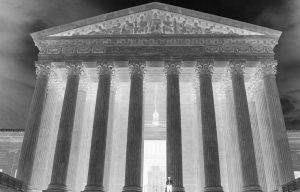
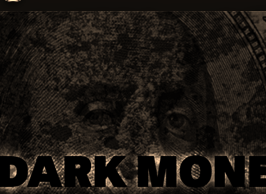
Dark Money And Conservative Courts
When Donald Trump became president in 2016, one of the most terrifying prospects was that he could signal a new era for the Supreme Court of the United States – where vacancies would be strategically filled to create one of the most conservative courts in nearly a century, which could roll back constitutional rights and liberties we’ve been taking for granted. Indeed, even though Donald Trump was not re-elected in 2020, the conservative 6-3 majority that exists, and the havoc they are wreaking, could last for decades. While I’m sure Donald Trump would like to take all the credit, the battle to buy Supreme Court influence and push votes to the right long precedes his tenure as president.
Guest – Andrew Perez, has devoted his life and career to exposing the money, influence and secret transactions made among the most powerful people in the world to control the United States laws, government and people. He is an investigative reporter and senior editor for The Lever, which was just awarded the 2023 Izzy Award for outstanding achievement in the independent media by Park Center for Independent Media at Ithaca College for its relentless work “exposing the corrupting influence of corporate power on government and both major parties.” In announcing the award, the Center for Independent Media highlighted Andrew’s work for exposing the largest known political donation in U.S. history — Chicago businessman Barre Seid’s $1.6 billion dark money transfer to conservative operative Leonard Leo who served as Donald Trump’s judicial advisor – and guess who Leonard Leo appears to ready to back now … Republican presidential candidate Ron DeSantis.

———————————-
Academic Freedom, Civil Liberties, Civil Rights, Political Prisoner, Prison Industry, Violations of U.S. and International Law, Whistleblowers
Podcast: Play in new window | Download
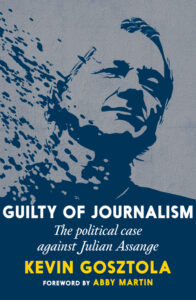

Guilty of Journalism
The pending criminal case against journalist Julian Assange is the most significant far reaching First Amendment matter in our lifetime. It will have, in fact it already has had, an impact on publishing and journalism. This is so because it constricts our freedom to know as well as journalists and publishers freedom to publish.
Our government functions as the executive committee of the ruling rich. It intends to keep it this way, in the words of the great civil rights attorney William Kunstler, “by any means necessary and for as long as possible.”
If as is likely the imprisoned journalist Julian Assange is extradited at America’s request from his solitary prison cell in London’s Belmarsh prison where he has been kept for four years and sent to Virginia to be tried for espionage he will be certainly be convicted and sentenced to life in prison.
His victimization is being accomplished under the 1917 Espionage Act, a law originally put into place during World War I to imprison spies. It is now used to get truth tellers like Julian Assange silenced.
Julian Assange Fact Sheet: Why Julian Must Be Freed
Guest – Kevin Gosztola who more than anyone has covered the whistleblower situation since he attended the court martial trial of Sergeant Chelsea Manning. Manning was convicted of giving government secrets to Julian Assange. Kevin Gosztola‘s book “Guilty of Journalism “was published by Seven Stories Press and Censored Press last month.
—-

Attorney Stephen Rohde: A Set Of Ideas Under Threat
American history has been marked by ongoing conflicts between those who are seeking an open, equal and inclusive society and those who cling to the racist origins of the United States and seek to literally whitewash that history and perpetuate white privilege.
We find ourselves in the midst of one of those conflicts today. The right of Black people to learn their own history is being denied them. The same is true of anyone who is not heterosexual.
The teaching of critical race theory is increasingly disallowed. The study of human sexuality in schools is being obliterated. Books are being banned in record numbers, and curricula is being rewritten to conform to a sanitized version of American history. Seven states, including Florida, Tennessee, Oklahoma and Utah, have already passed laws limiting materials in libraries…and at least 113 bills are pending across the country that would negatively impact libraries or curtail peoples’ freedom to read.
As Jonathan Friedman, the Director of free expression and education at PEN America, a free speech organization said, “People need to understand that it’s not a single book being removed in a single school district, it’s a set of ideas that are under threat just about everywhere.”
Guest – Stephen Rohde is a noted constitutional scholar and activist. He is the past Chair of the ACLU Foundation of Southern California; the founder and current Chair of Interfaith Communities United for Justice and Peace; the author of American Words of Freedom, and of Freedom of Assembly. Steve Rohde is a regular contributor to TruthDig as well as the Los Angeles Review of Books.
Hosted by attorneys Michael Smith and Jim Lafferty

————————-
Civil Liberties, Civil Rights, Human Rights, Prison Industry, Racist Police Violence, U.S. Militarism
Podcast: Play in new window | Download
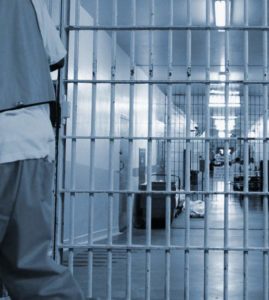
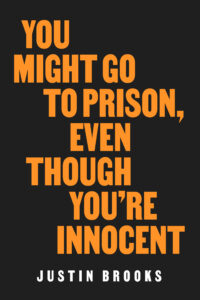
You Might Go to Prison, Even Though You’re Innocent
There is a common belief that if you’re arrested, you are probably guilty because “where there’s smoke, there’s fire.” People assume that only the guilty confess to crimes because why would an innocent person confess to a crime they didn’t commit? And when a person pleads guilty or is convicted by a jury, that’s the end of the matter, in the minds of most people.
In fact, many innocent people are arrested, especially people of color, due to racial profiling and other forms of discrimination by law enforcement. Implicit bias often infects the case as it moves through the criminal legal system – from the initial police stop, to interrogation, arrest, charging, trial and sentencing. This is particularly tragic when a person is charged with a capital crime for which the death penalty is imposed and that sentence is carried out.
However, it is estimated that 10,000 to 20,000 people are currently serving time in prison after being convicted of crimes they did not commit, largely due to prosecutorial misconduct and police misconduct. Unfortunately, even when exonerated, the psychological and physical damage done is so extensive that many people are never able to fully recover from the trauma. In addition, when the wrongful conviction is solely the result of prosecutorial misconduct, those convicted have no legal recourse to be compensated for the wrong done to them because of prosecutorial immunity.
Guest – Justin Brooks criminal defense attorney and law professor has spent decades working to free innocent people from prison. The Founding Director of the California Innocence Project, Brooks is the author of the provocative new book, “You Might Go to Prison, Even Though You’re Innocent.” In it, he discusses false identifications, junk science, lying snitches, and incompetent defense lawyers – which too often lead to the imprisonment of innocent people.
—–

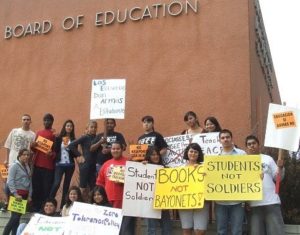
Junior ROTC In High Schools: Pressure To Join
On her first day of high school, Andreya Thomas and several other freshmen at Detroit’s Pershing High School learned they were enrolled in a class called J.R.O.T.C., or Junior Reserve Officers’ Training Corps. School administrators told them the program was mandatory.
Funded by the U.S. military, the program required students to wear military uniforms in class, recite patriotic declarations, and obey orders from an instructor who often yelled at them. When several tried to drop the class, school officials refused permission, even though the Pentagon says that requiring students to take the programs runs counter to its guidelines. The New York Times recently learned that thousands of public-school students were enrolled in J.R.O.T.C. either as a requirement or through automatic enrollment. Most of the schools with high enrollment numbers were attended largely by nonwhite students and those from low-income households.
Critics of Junior ROTC say that the program’s militaristic discipline prioritizes obedience over independence and critical thinking. And as we reported earlier on Law and Disorder, and now noted by the Times, the program’s textbooks often rewrite or downplay the failings of the U.S. government. With its concentration in schools with low-income and nonwhite students, some claim J.R.O.T.C. encourages students to enlist in the military rather than explore other routes to college or jobs in the civilian economy.
Guest – Rick Jahnkow works for two San Diego-based anti-militarist organizations, the Project on Youth and Non-Military Opportunities, or YANO, and the Committee Opposed to Militarism and the Draft. We spoke earlier with Rick about YANO’s J.R.O.T.C. textbook review project.
Hosted by Attorneys Heidi Boghosian, Marjorie Cohn and Julie Hurwitz

—————————————–






















